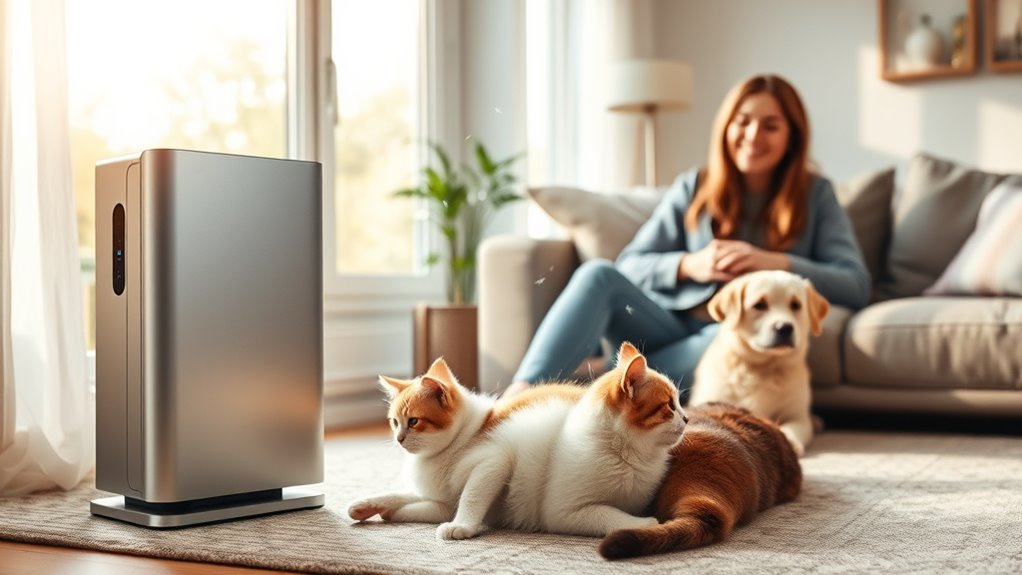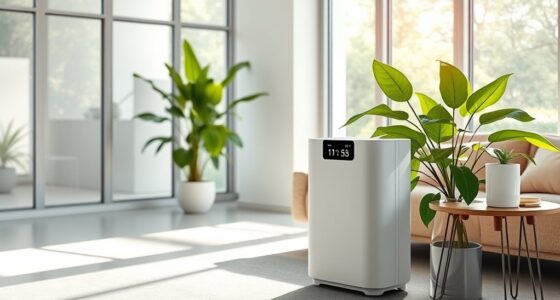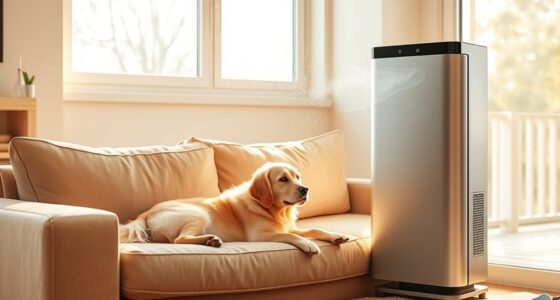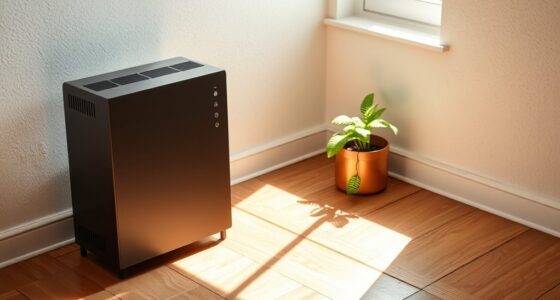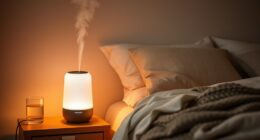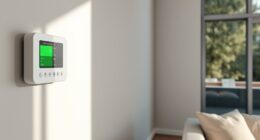Yes, air purifiers can help eliminate pet odors effectively. They use HEPA filters to trap pet dander, hair, and tiny particles that carry smells, while activated charcoal filters adsorb odor molecules, reducing lingering odors. Regular use of a purifier with both filters improves air quality and keeps your home smelling fresher. To learn how to maximize their benefits and keep your space odor-free, there’s more to discover.
Key Takeaways
- Air purifiers with HEPA filters trap pet dander and hair, reducing sources of odors.
- Activated charcoal filters adsorb odor molecules, actively removing pet smells from the air.
- Combining HEPA and charcoal filters enhances overall odor elimination effectiveness.
- Regular use and timely filter replacements maintain the purifier’s ability to control pet odors.
- Air purifiers improve indoor air quality, making spaces smell fresher over time.
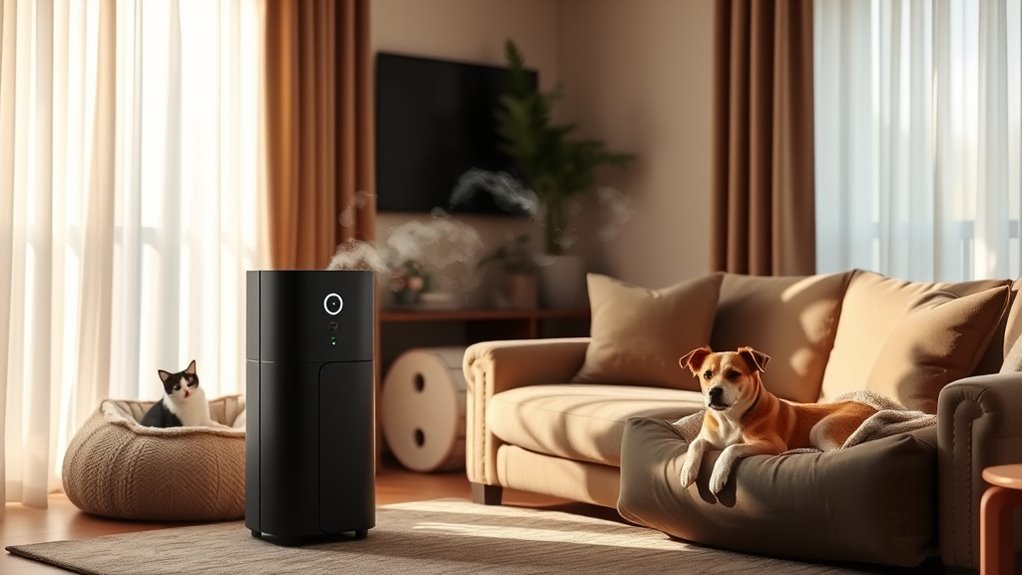
Pets bring joy to your home, but their odors can sometimes linger and become stubborn. When you’re trying to keep your space fresh and welcoming, air purifiers can be a helpful tool. They aren’t magic, but when used correctly, they substantially reduce pet-related smells. The key lies in choosing the right features, especially filters designed to target odors and airborne particles. HEPA filters are vital because they trap pet dander, hair, and other tiny particles that contribute to lingering smells. These filters can capture particles as small as 0.3 microns, meaning allergens and pet hair are effectively removed from the air. As a result, your home smells cleaner and feels healthier, especially if you or anyone in your household suffers from allergies.
However, odors are often caused by molecules that linger in the air, not just particles. That’s where activated charcoal filters come into play. Activated charcoal has a porous surface that adsorbs odor molecules, trapping them and preventing them from circulating in your living space. When paired with a HEPA filter, an air purifier equipped with activated charcoal can tackle both the airborne particles and the smell molecules. This combination is particularly effective for pet odors because it doesn’t just mask the smell but removes the source from the air itself.
Using an air purifier with HEPA and activated charcoal filters won’t eliminate pet odors overnight, but with regular use, you’ll notice a notable improvement. The air will feel fresher, and your home will smell cleaner. Remember, maintaining the filters is vital—replace them as recommended by the manufacturer to guarantee optimal performance. Proper air filtration can significantly enhance indoor air quality and reduce persistent pet odors. When you combine good ventilation, regular cleaning, and a quality air purifier equipped with HEPA and activated charcoal filters, you’ll create a healthier, more inviting environment for both your pets and your family.
Frequently Asked Questions
Do Air Purifiers Also Remove Pet Dander Effectively?
Air purification devices are effective at removing pet dander from your indoor air, which can reduce allergy symptoms and improve overall air quality. They typically use HEPA filters that trap tiny particles like dander, helping to keep your environment cleaner. While they are great for dander, for scent elimination, consider models with activated carbon filters. Combining air purification with regular cleaning can markedly improve your home’s air quality and reduce pet odors.
How Often Should I Replace Filters in My Air Purifier?
Imagine your air purifier’s filter as a silent guardian, working tirelessly. To keep it effective, follow the recommended maintenance schedule, typically replacing filters every 3 to 6 months. This guarantees ideal filter lifespan and maintains air quality. Regular checks prevent buildup and ensure your device continues to perform well. Remember, timely replacements are key to maintaining a healthy environment in your home.
Are There Specific Air Purifier Features Best for Pet Odors?
When choosing an air purifier for pet odors, look for features like HEPA filters and activated carbon filters. HEPA filters trap pet dander and allergens, while activated carbon absorbs odors effectively. You should select a purifier with these features to best combat pet smells. Regular filter replacements are essential to maintain performance, so check your device’s guidelines to guarantee continued odor elimination and air quality improvement.
Can Air Purifiers Eliminate All Types of Pet Smells?
They say a chain is only as strong as its weakest link, and with pet odors, an air purifier’s limitations can leave some smells lingering. You might find it effective on certain pet odor types, but others—like stubborn urine or wet dog smell—may require targeted cleaning. While an air purifier helps, it’s no magic bullet. For best results, combine it with regular cleaning and proper ventilation.
Do Air Purifiers Help With Pet-Related Allergies?
You might wonder if air purifiers help with pet-related allergies. They improve air quality by filtering out pet dander, dust, and allergens that trigger allergy symptoms. Using an air purifier with a HEPA filter can provide relief by capturing tiny particles your nose and lungs react to. Regularly maintaining the device and keeping your space clean boosts allergy relief, making your environment more comfortable and healthier for you.
Conclusion
If you’re tired of persistent pet odors, an air purifier can be a game-changer. They effectively trap airborne particles and neutralize smells, making your home fresher. Did you know that over 60% of pet owners report noticeable improvements in indoor air quality after using air purifiers? By choosing the right model, you can enjoy a cleaner, more comfortable space for both you and your furry friends. Don’t wait—breathe easier today!
